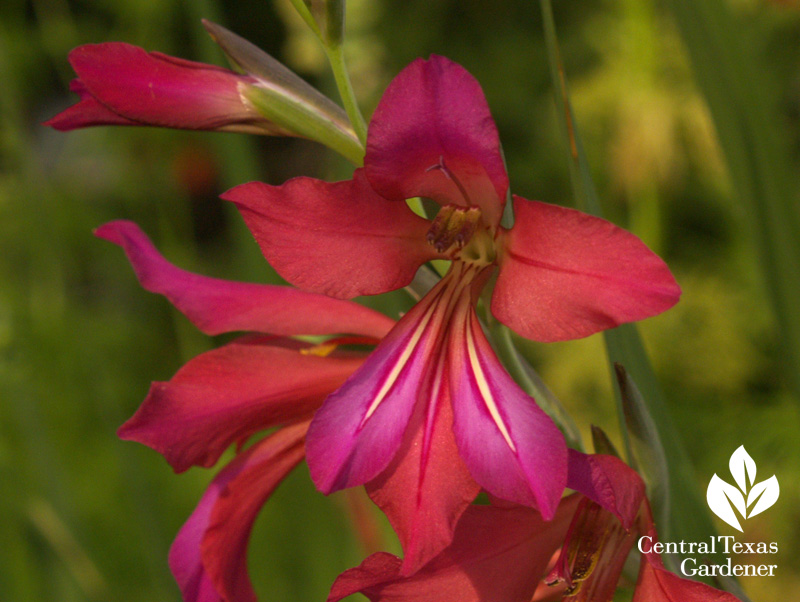April 19, 2012
Obsessed With Fascinating Plants
Plants fascinate me! With no internet connection whatsoever, they know exactly what to do when the time is right. My Byzantine gladiolus corms always greet winter with tidy upright leaves. They time their vivid flowers for April to make sure we notice them in spring madness.

Usually the larkspurs hang around to join them.

The cat cove rose arbor is a little out of control. I’ll tame it after I get my quota of homegrown perfume.

When I planted my Christmas present arbor a few years ago, I couldn’t decide which roses I wanted most. So on one side, I planted Buff Beauty.

On the other, New Dawn.

They’re good friends that astound me with their self-sufficiency and tenacity through flood, freeze, and drought, with fragrance so rich you can almost see it.
Equally self-motivated: Marie Pavie rose and Star jasmine (Trachelospermum jasminoides) in the patio cove. If I could bottle their fragrances (with a cute label, of course) I’d be rich, rich, rich!

I’ve trained my Star (Confederate) jasmine into a shrub form. You can also use it as a groundcover or as a vine to hide a chain link fence. Or on a trellis to hide the neighbor’s boat!

The white theme continues on the garden side of the patio with blackfoot daisy, winecup, and my new native frogfruit, already blooming tiny white flowers. They are too small to see in this view; will post pictures when they go into full gear.

This front bed got out its post-Easter whites, too. The stem of my Yucca pallida fell over in excitement to hunker down with purple heart.


One of the most fascinating plants in the world is the orchid. This week on Central Texas Gardener, I’m thrilled to meet with Susan Orlean, staff writer for The New Yorker, and author of The Orchid Thief.

If you’ve always wanted to meet her, now you can connect to this passionate writer who chronicles for us her journalistic exploration into the botanical intricacy of orchids. Susan also explains what started her obsession that drove her to swamps, abandon normal life, and ultimately inspire the movie Adaptation! Personally, I like the book much better!

On tour, meet orchid grower Monica Gaylord, who just steps outside her bedroom doors to an orchid greenhouse that soothes her soul and intrigues her mind.
Meet Monica in person and soothe your own soul at the Heart O’ Texas Orchid Society’s show and sale on April 28 and 29 at Zilker Botanical Garden. Like Susan Orlean, I bet the rest of the world will vanish as you gaze into flowers so intricate that they could inspire a book!
And what about this fascinating growth that’s showing up in gardens all over?

It’s slime mold, Daphne’s question of the week. Thanks to David McNiel for sending this in! Is it harmful? What should we do about it? Daphne reports that bacteria are their preferred food source.
Slime mold occurs when there is high relative humidity and warm temperatures—exactly our conditions lately. And no, they are not harmful. Enjoy them for their oddity or throw them in the compost pile.
Before you throw all your (non-seeding) weeds into the compost pile, turn them into nutritious fertilizer! Trisha Shirey explains how to make weed teas for your garden and container plants.

Get Trisha’s instructions and extensive list, which includes the nutrients and trace minerals from various weeds, old Swiss chard, comfrey, eggshells, coffee grounds and more.
Lots of events this weekend but here’s another: It’s About Thyme invites you to their free workshop on Sunday, April 22 at 20 p.m. George Altgelt from Geo Growers presents this Earth Day Special: “Realizing the Principles of Food Safety and Self-Reliance
within the Texas Home Gardening Tradition.”
See you next week! Linda

